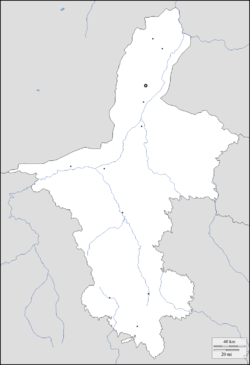Lingwu
Lingwu (simplified Chinese: 灵武市; traditional Chinese: 靈武市; pinyin: Língwǔ Shì) is a county-level city of Ningxia Hui Autonomous Region, Southwest China, it is under the administration of the prefecture-level city of Yinchuan. It is the most important industrial city of Ningxia.
Lingwu 灵武市 · لٍ ءُ شِ | |
|---|---|
 Lingwu Location in Ningxia | |
| Coordinates: 38.103°N 106.340°E | |
| Country | People's Republic of China |
| Region | Ningxia |
| Prefecture-level city | Yinchuan |
| Area | |
| • Total | 4,639 km2 (1,791 sq mi) |
| Population (2010 Census) | |
| • Total | 261,677 |
| • Density | 56/km2 (150/sq mi) |
| Time zone | UTC+8 (China Standard) |
History
Lingwu's former name is Lingzhou (simplified Chinese: 灵州; traditional Chinese: 靈州; pinyin: Lingzhou). During the Tang Dynasty, Emperor Suzong of Tang (711–762) fled to Lingzhou from Maweipo during the Anshi Rebellion, where he ascended the throne with the aid of loyal bureaucrats and military supporters, only notifying his father Xuanzong after the fact. Later on, Lingzhou became part of the Western Xia (Tangut Empire, 1032-1227). It was besieged by Genghis Khan in November 1226.
Economy
Lingwu is known for its growing of "Lingwu long jujube" (灵武长红枣). This fruit has proven to be one of Ningxia's most popular agricultural products, producing an income of over 10 million yuan per year.[1]
See also
- Empress Erzhu (Yuan Ye's wife)
- Gao Huan
- Lingwulong, named after Lingwu
- Yuwen Tai